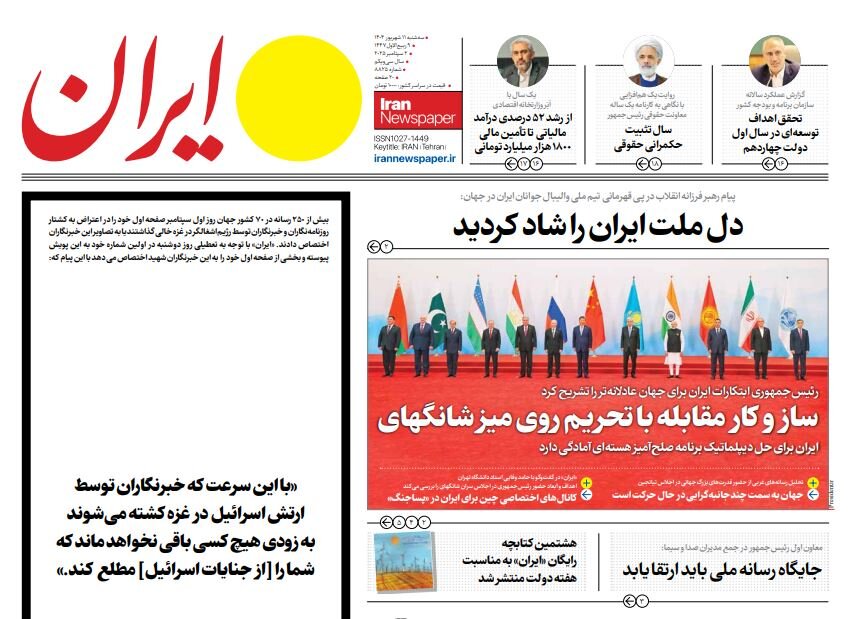Iran's diplomatic power after the war

TEHRAN - In a note, the Iran newspaper addressed President Masoud Pezeshkian's presence at the Shanghai Cooperation Organization (SCO) Summit in Tianjin and wrote: The presence of the Iranian president in the SCO summit is more important than others in many respects.
The importance of the event is that while the Chinese president hosts a significant number of heads of state in the two-day summit, Pezeshkian reaffirms Iran’s position in the intensive program of heads of state and sideline meetings. This reminds us of the fact that Iran is an actor that cannot be ignored and its presence in the international arena carries a significant weight and prestige. Perhaps the most prominent aspect of this trip is the president's participation at a major international summit after the 12-day Iran-Israel war. This event is taking place in a situation where some Western and regional media outlets are trying to present a weak image of Iran. However, Iran's active presence among prominent Eurasian leaders, by redefining the country's power, shows that Iran still has the capacity to influence regional and trans-regional equations. This move is both a stabilization of the diplomatic position and a reflection of the relative stability of Iran's foreign policy after the crisis.
Kayhan: An important presence alongside regional powers
Kayhan discussed Iran's presence at the Shanghai Summit by seeking the views of Hooman Peymani, an expert on regional security issues. He said: The Shanghai Cooperation Organization was formed primarily to counter the expansion of Western influence in Central Asia and Eurasia. Within this framework, Iran's membership in the bloc has so far been more symbolic than operational. However, Iran's presence has not been useless, and this membership could pave the way for a more prominent presence in the economic and security arenas, especially in the context of the recent activation of the snapback mechanism (against Iran by the European troika). Even if the snapback mechanism returns (UN) sanctions the situation will be different from the past. Today, there is no global consensus on sanctions against Iran. Many countries, even U.S. allies, are under pressure from Washington's policies. China and Russia, that themselves are facing Western sanctions, have a very strong incentive to counter the snapback mechanism and reassert their own positions. Powerful Shanghai members such as Russia and China may be more inclined to support Iran outside the organization because they see a threat to Iran as a threat to themselves.
Khorasan: Importance of aligning with China’s interests
In an article, Khorasan discussed the importance of aligning Iran’s interests with China. It wrote: China’s current policy towards the current conflict between Iran and Israel is “profit-oriented neutrality”, verbal opposition to attacks, repeated emphasis on ceasefires and humanitarian support, protection of energy and financial arteries, and rapid regulation of oil flows. This framework has a clear message: China remains a risk manager and does not become an actor on the battlefield. At least in the current timeframe, Beijing’s support for Tehran cannot be expected, but rather the focus should be on aligning China’s interests with regional stability in a more effective way. Also, using China’s mediation capacity in the form of limited military-security talks could be a viable policy based on Iran’s national interests. If China’s interests outweigh its costs in supporting Iran, Beijing’s profit-oriented neutrality will work in Tehran’s favor without expecting it to stand by Iran as a wartime ally.
Ham Mihan: Activation of snapback and impact on oil sale
In an interview with Masoud Hashemian, an expert in strategic energy management, Ham Mihan examined the impact of snapback sanctions on Iran’s oil sales. He said: Snapback has no effect on our oil sales at the moment and only has a psychological effect. The U.S. and Israel are seeking a consensus against Iran. Since the U.S. withdrew from the JCPOA, the Europeans have also practically withdrawn from the JCPOA. The Americans tightened sanctions on us and are tightening them every day, which has caused us not to have a normal trade system with the h world in any field. However, the National Iranian Oil Company has always found solutions, and basically, the sanctions have not affected Iran’s oil sales. Of course, it would have been better if we had conducted these exchanges based on the smooth international trade exchanges. However, we have mastered this kind of sales and know the ways to evade the sanctions. This is also true for the export of petrochemicals. However, it is unlikely that there will be any changes in the commercial and transportation systems in the oil and energy sectors based on the snapback.
Leave a Comment